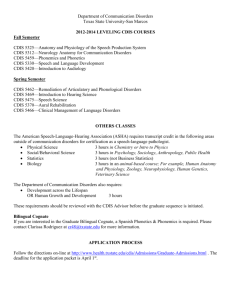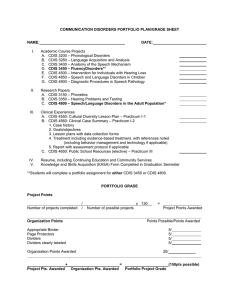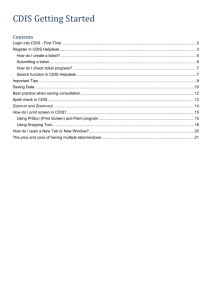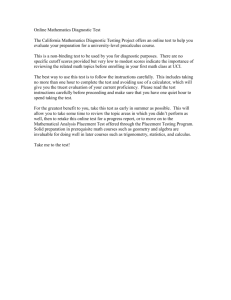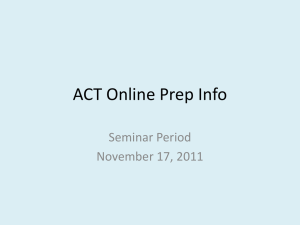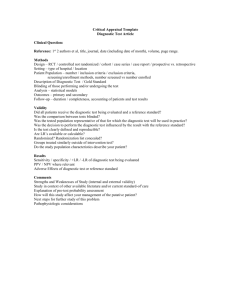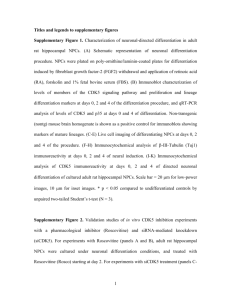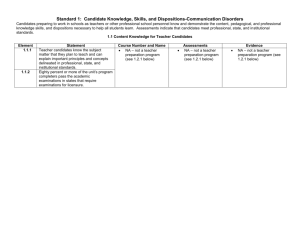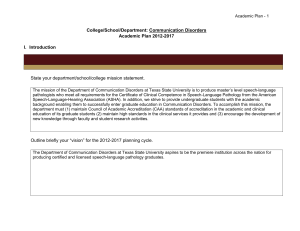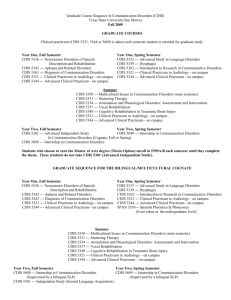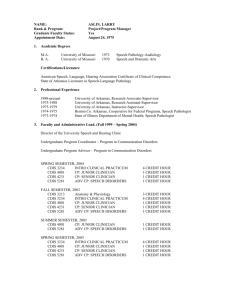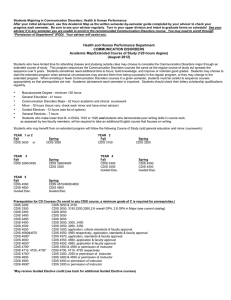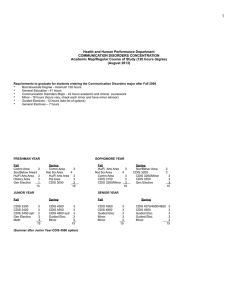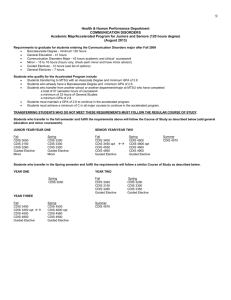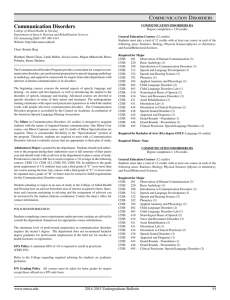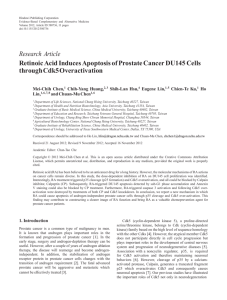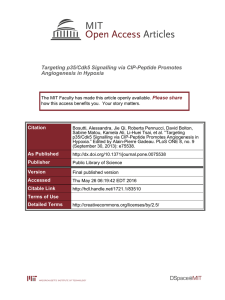CDIS 5182 - University of Arkansas
advertisement
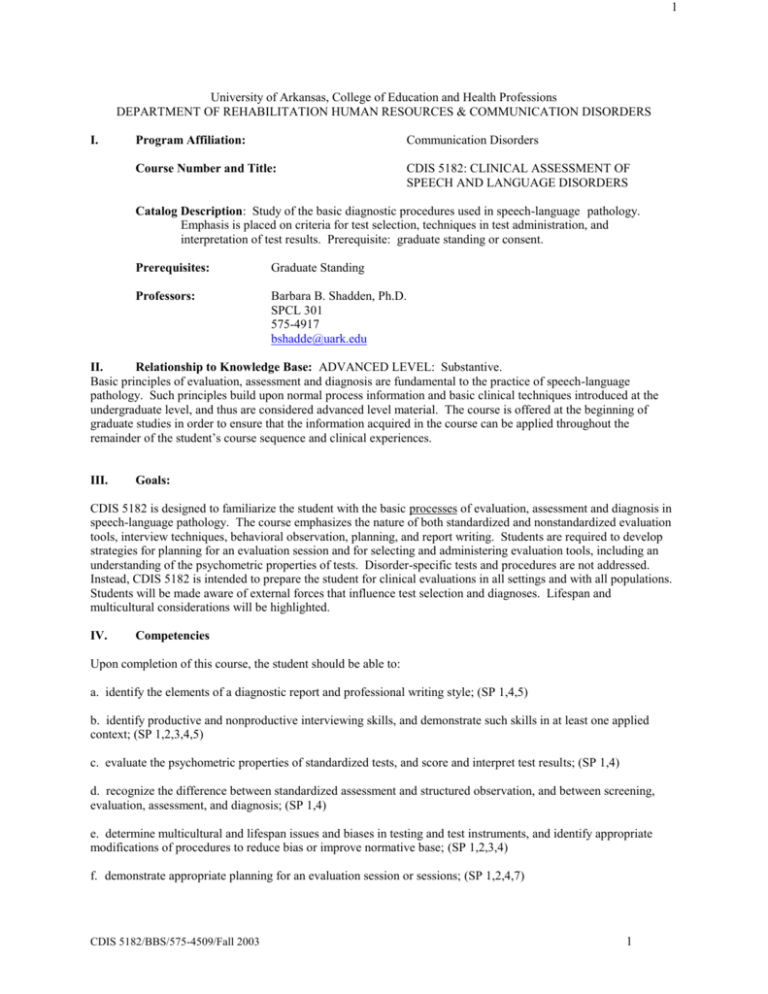
1 University of Arkansas, College of Education and Health Professions DEPARTMENT OF REHABILITATION HUMAN RESOURCES & COMMUNICATION DISORDERS I. Program Affiliation: Communication Disorders Course Number and Title: CDIS 5182: CLINICAL ASSESSMENT OF SPEECH AND LANGUAGE DISORDERS Catalog Description: Study of the basic diagnostic procedures used in speech-language pathology. Emphasis is placed on criteria for test selection, techniques in test administration, and interpretation of test results. Prerequisite: graduate standing or consent. Prerequisites: Graduate Standing Professors: Barbara B. Shadden, Ph.D. SPCL 301 575-4917 bshadde@uark.edu II. Relationship to Knowledge Base: ADVANCED LEVEL: Substantive. Basic principles of evaluation, assessment and diagnosis are fundamental to the practice of speech-language pathology. Such principles build upon normal process information and basic clinical techniques introduced at the undergraduate level, and thus are considered advanced level material. The course is offered at the beginning of graduate studies in order to ensure that the information acquired in the course can be applied throughout the remainder of the student’s course sequence and clinical experiences. III. Goals: CDIS 5182 is designed to familiarize the student with the basic processes of evaluation, assessment and diagnosis in speech-language pathology. The course emphasizes the nature of both standardized and nonstandardized evaluation tools, interview techniques, behavioral observation, planning, and report writing. Students are required to develop strategies for planning for an evaluation session and for selecting and administering evaluation tools, including an understanding of the psychometric properties of tests. Disorder-specific tests and procedures are not addressed. Instead, CDIS 5182 is intended to prepare the student for clinical evaluations in all settings and with all populations. Students will be made aware of external forces that influence test selection and diagnoses. Lifespan and multicultural considerations will be highlighted. IV. Competencies Upon completion of this course, the student should be able to: a. identify the elements of a diagnostic report and professional writing style; (SP 1,4,5) b. identify productive and nonproductive interviewing skills, and demonstrate such skills in at least one applied context; (SP 1,2,3,4,5) c. evaluate the psychometric properties of standardized tests, and score and interpret test results; (SP 1,4) d. recognize the difference between standardized assessment and structured observation, and between screening, evaluation, assessment, and diagnosis; (SP 1,4) e. determine multicultural and lifespan issues and biases in testing and test instruments, and identify appropriate modifications of procedures to reduce bias or improve normative base; (SP 1,2,3,4) f. demonstrate appropriate planning for an evaluation session or sessions; (SP 1,2,4,7) CDIS 5182/BBS/575-4509/Fall 2003 1 2 g. evaluate his/her own diagnostic skills (related to all of the above domains). (SP 4) V. Content I. Overview of Evaluation and Diagnostic Process A. Definition of terms 1. Screening 2. Evaluation 3. Assessment 4. Diagnosis B. Purposes of evaluation and diagnosis C. Pitfalls in assessment READINGS: Text, Chapter 1 II. Psychometric properties of tests and test selection issues A. Types of tests B. Validity and reliability C. Statistical measures; scoring and interpretation D. Criteria for evaluating new and existing standardized tests E. Test outcomes = disorder: the dangers of administering standardized tests F. How do I pick a test for assessment? READINGS: Text, Chapter 3 Packet III. The oral-peripheral examination READINGS: Hall, Chapter 4, in Tomblin et al. Also, 2 videos and 1 CD for use in class and outside class assignments IV. Interviewing skills, formats, and purposes A. Information-giving interview B. Interview-getting interview C. Interview techniques and observation of verbal and nonverbal behaviors D. Self-analysis READINGS: Text, Chapter 2 Shipley, Chapters 4, 5, and 6 V. Planning an evaluation A. Selection of procedures and tests B. Order of procedures C. Flexibility and modifications during the process VI. Report writing A. Format(s) 1. The university training program 2. SOAP format 3. The educational setting 4. Other B. Elements common to all reports C. Common writing and stylistic problems READINGS: Text, Chapter 13 Middleton, Technical aspects of report writing CDIS 5182/BBS/575-4509/Fall 2003 2 3 Packet VII. Language sampling/functional assessment VIII. Standardized vs. nonstandardized assessment procedures A. Mandates from the workplace B. Advantages and disadvantages for formal vs. “informal” procedures C. Measurement of impairment, disability, and/or handicap E. Team assessments IX. Multicultural and lifespan considerations A. Test bias B. Alternative procedures C. Bias-free and politically correct language D. Defining norms READINGS: Packet VI. Evaluation: During the Fall of 2002, a significant portion of the learning experience in CDIS 5182 and CDIS 5381 will involve a process of individual and team planning, interpretation of diagnostic findings, and self-evaluation. The Friday sessions will typically be used for staffing evaluations coming up, or debriefing on evaluations completed during a specific week. Students will be assigned responsibility for reporting on specific Fridays, although any discussion of clinical evaluations is fair game. Feedback about your performance in diagnostic practicum outside of the course will be used, along with staffing participation, to determine your grade for CDIS 5381. Unless otherwise noted, students are required to work individually on all assignments and projects. Assignments are as follows: A. Mid-term examination -- In-class examination covering basic aspects of evaluation and related terminology, psychometric properties of tests and test selection issues, and some components of interviewing (outline sections I to IV). Points = approximately 125. B. Test Scoring/Interpretation Assignment -- Each student will be provided with test protocols with raw data for 3 standardized tests. You must score the test appropriately and interpret according the test manual guidelines and your understanding of the psychometric properties of tests. Points = 75. C. Standardized Test Written Summaries –Each student will be assigned specific speech/language tests to review. After review, the student will write a “template” statement that can be used to report test outcomes in a diagnostic report. Points = 75. D, Diagnostic Report Critique -- Students will be provided with a sample diagnostic report and will be required to critique the report for organization, appropriate placement of information under various headings, and professional writing style. The written critique will consist of actual editing of the report, along with any other summary notes needed to explain to the writer areas that need change. Points = 75. E, Oral Mechanism Assignment -- Each student will be required to perform a thorough oral mechanism examination on a child or adult and write up the results of that examination in a detailed fashion. The individual does not have to be a client. Points = 50. F. Interview Critique. – 1) Each student will evaluate an interview between a graduate clinician and a client and/or family member. An analysis rubric will be used, along with detailed written comments assessing performance in the interview. 2) Each student will the role play an interview with Dr. Shadden as the parent, spouse, or client seeking evaluation services at the Speech and Hearing Clinic. Students will evaluate their own performance using a grading rubric and written summary. Dr. Shadden will independently evaluate the videotaped interview. Total points = 100. CDIS 5182/BBS/575-4509/Fall 2003 3 4 G. Class participation. Because class participation will be critical, particularly in the second half of the class, class participation will also be evaluated. The rubric used to assess participation is appended to this syllabus. Class participation will be worth 50 points. H. Planning project – About halfway through the semester, each student will be provided with information about a client. No two cases will be exactly alike. For the final project, you will be asked to identify additional information that you would need (ideally) to do a complete evaluation. You will also plan the evaluation (tests, other procedures, sequence of activities). Any particular obstacles you anticipate should be identified. Points = 75. I. Final examination. A final examination will be held during finals week. Format of the examination will be discussed in class. Points = approximately 125. VII. Syllabus Change The instructor reserves the right to make changes as necessary to this syllabus. If changes are made, advance notification will be given to the class. VIII. Grading Scale A = 90-100% B = 80-89.9% C = 70-79.9% D = 60-69.9% F = below 60% IX. Academic Honesty The application of the University of Arkansas Academic Honesty Policy, as stated in the Student Handbook, will be fully adhered to in this course. Grades and degrees earned by dishonest means devalue those earned by all students; therefore, it is important that students are aware of the University of Arkansas Academic Honesty Policy. Academic dishonesty involves acts which may subvert or compromise the integrity of the educational process. X. Accommodations Students with disabilities requesting reasonable accommodations must first register with the Center for Students with Disabilities. The CSD is located in the Arkansas Union, room 104 and on the web at http://www.uark.edu/ua/csd/applications.htm. The CSD provides documentation to students with disabilities, who must then provide this documentation to their course instructors. Students with disabilities should notify their course instructors of their need for reasonable accommodations in a timely manner to ensure sufficient time to arrange reasonable accommodation implementation and effectiveness. A typical time frame for arranging reasonable accommodations for students who are registered with the CSD is approximately one to two weeks. Classroom Behaviors Appropriate classroom behavior is expected of the instructor and all students. Inappropriate and disruptive classroom behavior (inappropriate language and gestures, class disruptions, disrespect to other students or instructor, and other behavior as determined by the instructor) will not be tolerated and will result in possible removal from class and/or disciplinary action as per the student handbook. XI. INCLEMENT WEATHER In case of inclement weather, students are advised to call 575-4917, where I will leave a voice mail message about classes. In general, if Fayetteville Public Schools are closed, I will be canceling class. However, under no circumstances do I want any student to take unnecessary risks traveling in inclement weather. No student will be penalized for missing class on inclement weather days. University closing announcements are made on KUAF Radio 91.3, as well as local radio and television stations. The University’s inclement weather site is updated frequently on both UARKINFO and University Online at http://pigtrail.uark.edu/info/weather.nclk. CDIS 5182/BBS/575-4509/Fall 2003 4 5 XII. Course Resources A. University Library B. Professor's Library C. Speech and Hearing Clinic Library D. Selected videotapes and support materials XIII. Inclement Weather Policy In general, the University of Arkansas does not close because of inclement weather. Instead, decisions about holding classes are left up to the individual instructor. In case of inclement weather, students should first listen to the news and/or call the main university information number to determine whether or not the university is open. If the university is open, students may call the main clinic number (575-4509) to find out whether a particular class is being held. Even if the class is being held, no student should take unnecessary risks in order to attend that class. There will be no penalty for failure to attend and any in-class examinations or other assignments will be postponed if all class members cannot be present. XI. Research Base: Required Text: Haynes, W.O., & Pindzola, R.H.. (1998). Diagnosis and evaluation in speech pathology (5th edition). Englewood Cliffs, NJ: Prentice Hall. Additional Readings: Selected chapters from: Middleton, B., et al. (1992). Report writing for speech-language pathologists. Tucson, AZ: Communication Skill Builders. Shipley, K. (1992). Interviewing and counseling in communicative disorders: Principles and practices. New York: Merrill. Tomblin, J.B., Morris, H.L., Spriestersbach, D.C. (1994). Diagnosis in speech-language pathology. San Diego, CA: Singular Publishing Packet -- Available through Book Exchanges CDIS 5182/BBS/575-4509/Fall 2003 5
